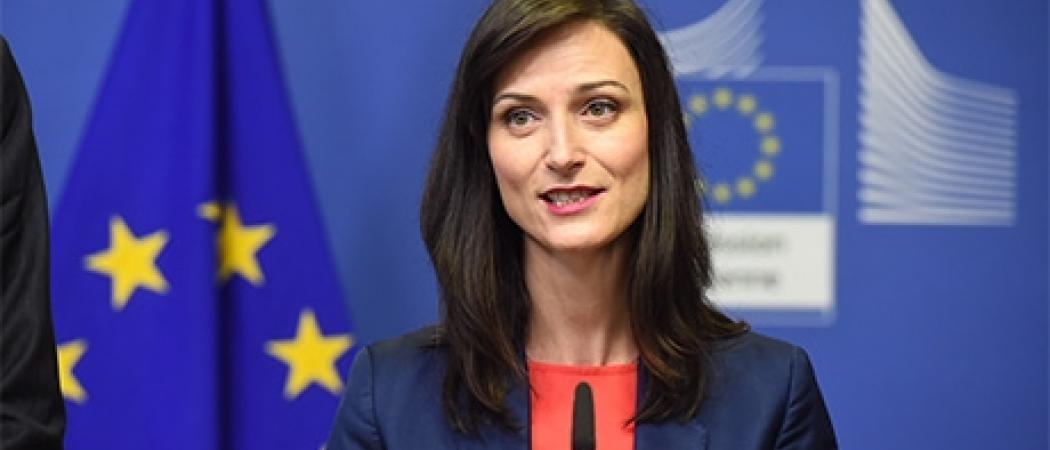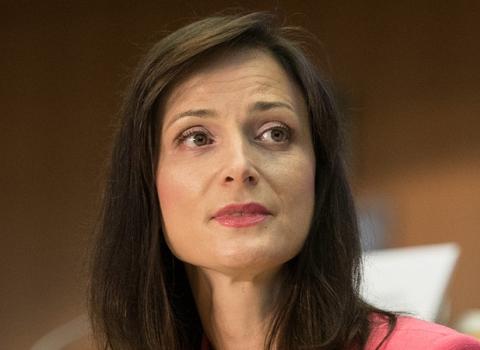Research commissioner Mariya Gabriel tells a Science|Business online conference her team and commission services are working out exact details of how €13.5B from COVID-19 recovery fund is to be allocated within Horizon Europe

Mariya Gabriel. Photo: European Commission.
The European Commission is redrafting parts of Horizon Europe to reflect lessons from the coronavirus pandemic, says the research and innovation commissioner Mariya Gabriel.
“It’s clear that after the crisis we should reorient some of our priorities in a more strategic way,” she told a Science|Business online conference. “One of the most important things is really to integrate our lessons learned during the crisis.”
As one part of the redrafting, a new partnership on pandemic preparedness is being drawn up.
Meanwhile, the commission continues work on the Horizon Europe strategic plan, setting out the main policy priorities of the research programme and the specific goals it should achieve. Gabriel said it will be published “before the end of the year”. The commission will then be able to move forward with the official launch of research missions and partnerships.
The multiannual budget plan put forward in May, which includes €13.5 billion going into Horizon Europe from the pandemic recovery fund, should be read as a signal that, “the role of science, research [and] innovation is fully taken into consideration,” said Gabriel. Her team and commission services are working out exact details of how the €13.5 billion will be allocated within the programme.
“Now it is up to us to see what are the strategic investments, the strategic elements in our programme, where we really need to have this well-targeted funding, released in a very fast way,” said Gabriel. “That will be the next step.”
And while declining to provide further details, Gabriel gave a reassurance the final shape of Horizon Europe is being worked out jointly with member states.
The commission is also waiting for member states to agree on the EU’s overall budget for the next seven years, allowing Horizon Europe to start on time in January 2021.
A more resilient health system
One of the main priorities for the EU in the coming years will be to ensure healthcare systems are capable of dealing with future pandemics. “The crisis has revealed that we need to strengthen our health crisis management, and the resilience of our health systems,” Gabriel said.
The commission has announced plans for a pandemic preparedness research partnership in Horizon Europe, but is yet to scope its focus and expected impact. According to Gabriel, the partnership will seek to pull in knowledge and technology from many fields. “Definitely this partnership goes beyond the health sector,” she said.
One element will be to find better ways to collect and share health data across countries. Some projects are already working on this with the help of EU grants, while the commission is working on a new European Health Data Space. “We all have seen that digital technologies can help us a lot,” Gabriel said.
New ERA
The pandemic has delayed Gabriel’s plans to launch a proposal to revitalise the European Research Area (ERA), a venerable initiative to create a single market for research in the EU.
The launch was planned for the first week of July, but was postponed until after the summer, as the pandemic forced EU institutions to focus on crisis management, a commission spokeswoman told Science|Business. A refreshed ERA will act as “a strategic umbrella for the Horizon Europe programme, fostering its alignment with national research and innovation programmes,” she said.





 A unique international forum for public research organisations and companies to connect their external engagement with strategic interests around their R&D system.
A unique international forum for public research organisations and companies to connect their external engagement with strategic interests around their R&D system.